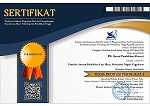Improving Basic Movement Skills of Pencak Silat Empty-Hand Moves for Students with Physical Disabilities through Peer Teaching at Elementary School 1 Giritirto Karanggayam
Downloads
The purpose of this study is to improve basic unarmed pencak silat skills in students with physical disabilities through a peer tutor approach at SD Negeri 1 Giritirto Karanggayam. This study aims to develop an adaptive learning model to increase student participation in physical activities and support an inclusive school environment (Fernández-Batanero et al., 2024). The research subject was a 10-year-old fifth-grade student. The method used was classroom action research (CAR) with two cycles, including planning, action, observation, and reflection stages. The results showed an increase in ability from 53% before the action to 66% in cycle I and 80% in cycle II, exceeding the success criterion of 75%. The peer tutor approach proved effective in improving the striking, kicking, and basic movement coordination skills of students with physical disabilities in pencak silat, as well as fostering self-confidence, motivation, empathy, and social awareness among students and physical education teachers. Further research is recommended to test the effectiveness of this method on other types of disabilities and compare it with other inclusive learning approaches.
Downloads
Boud, D., et al. (2021). Peer assessment in collaborative learning: Enhancing engagement and learning outcomes. Journal of Educational Practice, 34(5), 432-445.
Gumelar, N. F. (2018). Meningkatkan keterampilan pencak silat jurus tunggal tangan kosong melalui media audiovisual. Jurnal Speed (Sport, Physical Education, Empowerment), 1(2), 1218. Retrieved from https://journal. unsika. ac. id/index.php/speed/article/view/1079
Hartati, T., et al. (2022). Gap analysis between students with physical disabilities and current teaching approaches: A case for improved confidence and participation. Social and Behavioral Sciences Procedia, 55, 123–134.
Hartati, T., & Pramono, D. (2023). Challenges in implementing inclusive education for children with physical disabilities: A focus on curriculum adaptation. Journal of Inclusive Education Research, 10(3), 245-260.
Hidayat, A., Firmansyah, A., & Fauzan, R. (2019). Peer teaching effectiveness in improving motor skills in sports education. Jurnal Pendidikan Olahraga, 8(3), 133-140. Retrieved from https://ejournal. unib. ac.id/index.php/JPO/article/view/4191
Huang, F., & Lee, C. (2023). Challenges and strategies in implementing peer assessment for children with physical disabilities. Educational Review, 75(3), 456–470.
Huang, L., et al. (2021). Effects of martial arts training on motor skills and self-confidence in children with physical disabilities. Physical Education and Sport Pedagogy, 26(2), 134-145.
Kemmis, S., & McTaggart, R. (2005). Participatory action research: Communicative action and the public sphere. In Sage Publications Ltd.
Lesmana, H., Suranto, & Jubaedi, A. (2015). Peningkatan keterampilan jurus tangan kosong model pembelajaran kelompok dan berpasangan. JUPE (Jurnal Pendidikan Jasmani dan Kesehatan), 3(2), 19. Retrievedfromhttps://jurnal.fkip.unila.ac.id/index.php/JUPE/article/view/7766/4682
Rahardjo, P., et al. (2022). Collaborative learning and peer assessment in inclusive physical education: A case study. Procedia Social and Behavioral Sciences, 58, 678-685.
Rahardjo, R., et al. (2022). Teacher training and adaptive teaching methods for motor skill development in children with physical disabilities. Social and Behavioral Sciences Procedia, 54, 89–101.
Rimmer, J. H., et al. (2021). Physical activity and quality of life for children with physical disabilities: A global review. Archives of Physical Medicine and Rehabilitation, 102(8), 1571–1582.
Santoso, T. (2020). Peningkatan keterampilan gerak siswa melalui pembelajaran berbasis kelompok. Jurnal Ilmu Pendidikan Jasmani, 7(1), 45-52. Retrieved from https://jurnal. stkippgri.ac. id/index.php/jipj/article/view/109
Setyawan, D., & Suharto, T. (2023). Improving motor skills in martial arts education for children with disabilities. Journal of Sport Sciences, 75(3), 421–435.
Setyawan, D., et al. (2023). Modifying martial arts training for children with physical disabilities: A framework for inclusive practice. Journal of Adapted Physical Activity and Rehabilitation, 45(4), 345-360.
Sherrill, C., & Tripp, A. (2022). Discrimination and resource gaps in inclusive movement education for children with disabilities. Journal of Physical Therapy, 94(4), 321–334.
Sugiyanto, S., et al. (2023). Enhancing motivation and learning outcomes through collaborative learning strategies in inclusive education. Disability and Rehabilitation: Assistive Technology, 38(4), 526–540.
Sugiyono, S., & Santoso, W. (2022). Enhancing student engagement through peer assessment in martial arts education. Journal of Sport Pedagogy and Development, 18(1), 123-134.
World Health Organization (WHO). (2020). Physical activity and motor skill development as a fundamental right for children. Global Report on Physical Activity.
Copyright (c) 2025 JPK (Jurnal Pendidikan Khusus)

This work is licensed under a Creative Commons Attribution-ShareAlike 4.0 International License.
The copyright of the accepted for publication articles shall be assigned to JPK (Jurnal Pendidikan Khusus) as the publisher of the journal. The intended copyright includes the rights to publish articles in various forms (including reprints).














